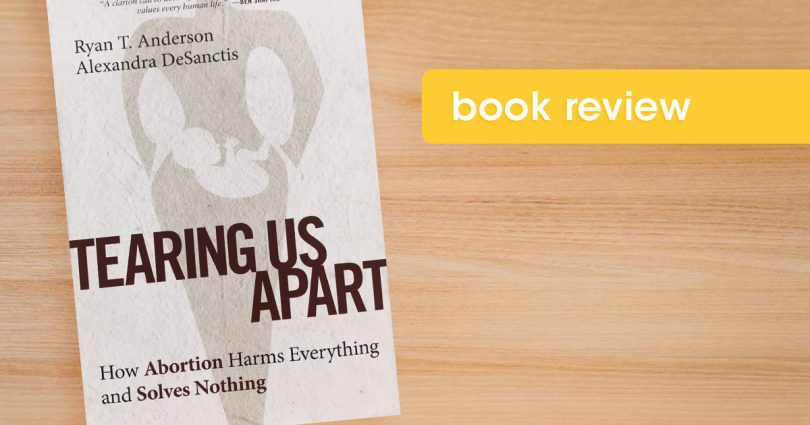Anybody who thinks abortion is just about abortion needs to read Tearing Us Apart. Anderson and DeSanctis provide a tour de force of Roe v. Wade’s far-reaching ramifications: Legalized abortion is hardly just “a woman’s choice” but entails an entire vision of life, interpersonal relations, medicine, law, and culture that its votaries will viciously defend. If anybody doubts that we are in a culture war or believes that fighting it is beneath us, ignore him: He’s grossly out of touch with reality.
In the first of seven clearly written chapters, the authors treat the case for preborn human life and the arguments used to deny it. They go on to explore abortion’s deleterious consequences for women, including their physical and mental health, and how abortionists try to sweep it all away as “pseudo-science.” They move to abortion’s implications for human equality, including the racist eugenics that motivated Margaret Sanger et al., the ongoing disparate impact of abortion on black and minority communities, the use of abortion to eliminate disability by eliminating the (possibly) disabled preborn, and the paradox of this indisputable “woman’s choice,” whose use in sex-selection abortions primarily targets females. They then address the deforming influence of abortion on medicine, including redefinitions of “medicine” (what does abortion “cure”?) and “health” (open-ended), fetal experimentation, and the contradiction that sanitary and practical standards otherwise universally applied across medicine suddenly become “burdensome” when applied to abortion clinics. They discuss the corrupting influence of abortion on law, where abortion remained for 50 years a “right” in search of a permanent constitutional perch, then address its spread into politics, creating the Democratic party’s narrow tent and distorting the judicial confirmation process. And finally they address how abortion has affected mass and social media, culture, and woke businesses to abandon neutral and objective standards in favor of unvarnished advocacy.
Tearing Us Apart ends on the threshold of Dobbs, so it does not take account of the last year’s developments; that’s grist for a second edition. But that doesn’t detract from the book, which gives us a thorough presentation of how we got to where we are. The conclusion offers prescient suggestions for pro-life labors were Roe reversed. It states, “A post-Roe America . . . will require both the ability to speak the truth and to reach people who don’t know it.” The authors show that the forces arrayed to stop that are quite formidable.
This book belongs in every pro-lifer’s library. Distribute it to others (including public and private libraries). Steven Christie’s Speaking for the Unborn is a better choice for a quick and simple presentation of pro-life arguments calibrated to the modern, abbreviated attention span, but for those who relish reading and thinking, Tearing Us Apart is the more developed, synthetic, and comprehensive argument. I’d grab it while I can: Considering the fate of Anderson’s takedown of transgenderism—When Harry Became Sally—expect no small effort to censor this book’s message.
Tearing Us Apart: How Abortion Harms Everything and Solves Nothing, by Ryan T. Anderson and Alexandra DeSanctis, Washington: Regnery Publishing, 2022, 256 pp.


Facebook Comments